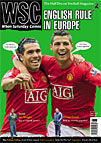 Ian Wright has quit the BBC to present Gladiators on Sky. Some are delighted, but his unique style will be lost, writes Cameron Carter
Ian Wright has quit the BBC to present Gladiators on Sky. Some are delighted, but his unique style will be lost, writes Cameron Carter
It hasn’t been the most resonant resignation. Ian Wright has severed his links with the BBC’s football coverage, complaining that the corporation had lost touch with real fans and that he had been cast in the role of “comedy jester” in his appearances as a pundit. For the sake of accuracy, Wright is not so much resigning as making himself unavailable, as his role was always a freelance one and, with the BBC losing the rights to live England games and FA Cup games from August, his future appearances would have been irregular at best. Patrick Mower declining to appear on any further editions of Give Us A Clue because Una Stubbs and Lionel Blair didn’t understand how the kids related to mime would be a workable comparison.
Wright’s departure raises an interesting point about public image and self-image. Does he honestly see himself bullied into the role of clown by his colleagues, while away from the cameras we must believe he is a serious and private man of the type that small birds fearlessly alight on? While obviously primed by a producer at some early stage to represent the views of the ordinary fan, Wright had the raw materials to create the clown image all by himself. He joined the team in 2001, straight out of retirement, and brought into the hushed studio the badinage and semi-hysteria of the dressing room. He called Alan Hansen “Al” and Gary Lineker “Links”, was passionate but largely incoherent when describing play, and sulked when England lost – famously refusing to comment after the Northern Ireland defeat and labelling the referee a “homer” after the Euro 2004 exit to Portugal before lapsing into a mute private hell.
The “comedy jester” quote, reproduced in isolation in the first paragraph of every report, was part of this longer comment to Broadcast magazine: “I feel like I am just there as a comedy jester to break the ice with Alan Shearer and Alan Hansen, who just do run-of-the-mill things. I can’t do that any more. People want something different.”
Not so many of the ordinary fans were with him. Responses on newspaper internet forums to the news were mixed, with approximately two-thirds not sorry to see Wright go. His lack of objectivity and detachment were cited, as well as his apparent inability to communicate a tactical point within the accepted confines of the English language. Although these were also his strong points. Wright looked and sounded just like all England fans do when they lose a big game. He was the only pundit remotely bearable at such times – impotently furious, then choked, then empty. Far better to be exposed to the antics of the guileless Wright than to Hansen’s best Scottish straight face or Lineker’s professional pall-bearer’s calm. Wright’s lack of self-censorship came across as childishly precocious to some, and probably still does to those who share a house with him, but it made him unpredictably entertaining in the midst of more careful senior colleagues who could clearly be woken up at 4am to phone in their analysis, so routine has their job become.
The claim “Fans want people who are dressed like them” was perhaps one of his weaker points. Wright trots out to get his paper in clothes far more expensive than most fans can afford and it is debatable that what viewers most truly desire to see in the half-time debate is Hansen, Shearer and Crooks wearing replica shirts and jeans. When Wright implies that Match of the Day is too straight and stuffy and that “people want something different”, he misunderstands why many prefer BBC sports coverage to that of other channels. Personality-led TV is more the province of commercial sector, precisely where Wright is now heading, with Kirsty Gallagher, to present the noisily resurrected Gladiators on Sky One.
If Wright aimed a few parting shots at his old employers, he didn’t get clear before receiving a couple back. A BBC spokesman, asked for a response to the Broadcast interview, adopted the passive-aggressive approach with the terse: “We wish Ian Wright all the best in his career with Talk Sport.” Gary Lineker’s team of scriptwriters couldn’t resist a more direct put-down on the very next Match of the Day. Referring to the climax of the title race, Lineker attempted his best Lynamesque twinkle: “It’s all too serious now for any court jesting, so I’m joined by Alan Shearer and Mark Lawrenson.”
What Wright brought to the BBC’s football coverage was a touch of reality TV – a variation in which an overly emotional man was placed in a small room and made to sit still and watch and talk about the game he loved to play. And now he has done a Leo Sayer and voted himself out. While some mutter that his departure is long overdue, I say: “Go free, Wrighty! Go free to where the noise and lights are!” I will miss the effervescent fellow.
From WSC 256 June 2008